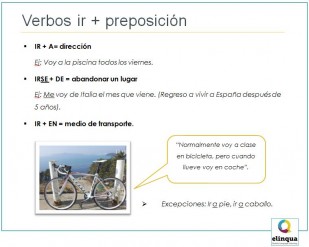
How to say there is in spanish
April 7, 2014Spanish possessive pronouns
April 12, 2014The verb to go in Spanish is the verb IR. Depending on the preposition it is followed by, it will have a different meaning:
– Ir + A = “Go to”. ex: Voy a la piscina todos los viernes = I go to the swimming pool every Friday.
– Ir + EN = “Go by”. ex: Normalmente voy a clase en bicicleta, pero cuando llueve voy en coche. = I normally go to class by bike, but when it rains I go by car.
The verb to go in Spanish , is different than the verb IRSE (ir + the pronoun ‘se’) doesn’t mean ‘to go’, but ‘to leave’.
– Irse + DE = ex: Me voy de Italia el mes que viene. = I’m leaving Italy next month.
(Attention: Unlike English, the verb ‘to leave’ in Spanish is followed by a preposition ~ IRSE DE).

The verb VENIR, also involves some kind of movement from one place to another. But in this case, the place where the speaker is located works as the main reference in the sentence. The English translation for “venir” would be “to come”, although the context English speakers use this verb is sometimes different than way it is used in Spanish.
– Venir a = the movement takes place between one specific spot and the place where the speaker is located. The speaker’s place is the destination of the trip.
– Venir de = the movement also takes place between one specific spot and the place where the speaker is located. Nevertheless, the focus of the sentence is the origin of the trip, not the destination.

If you are looking for personalized Spanish lessons, ELINQUA offers private Skype Spanish lessons. You can request a free trial class here.


